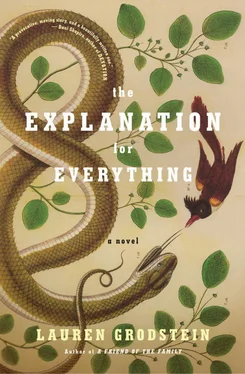That evening, Charles drove to Ms. Lim’s apartment in Princeton. He admitted to the police that he and Anita fought. He admitted to the police that he had broken off their engagement. But he left the apartment around 9:20, and several witnesses at the record store reported seeing him storm out of the building, angrily, slamming doors.
They saw Anita leave the apartment a few minutes after, sit on the stoop, and sob.
The following afternoon, upon the report of a flood in a downstairs apartment, Anita’s landlord discovered her body, in a sodden ochre heap, on the floor of her one-room apartment. She had hanged herself to a pipe, which had broken after she’d died, dropping her on the floor and leaking water all over her corpse. She’d left her note on the table, however, so it had stayed dry.
AT THE FUNERAL at Bethany, Mrs. Lim told well-wishers—and there were hundreds of well-wishers, customers, friends—that these past few months had been the happiest of her daughter’s life, and therefore the happiest of her own.
Andy’s mother’s flight left Ohio just ahead of a storm that would have kept her Akron-bound for days. It was always tricky to fly in and out of that airport, little planes and shortened runways, and Andy wondered what he would have done if she hadn’t made it. He could have cancelled his own ticket, let this one pass. He looked at himself in the mirror, the receding hairline, jackrabbit eyelids, brownish purple bags under the eyes.
There was no way he would have let this one pass.
They picked his mother up at the Atlantic City airport, took her to the White House Sub Shop where the four of them shared a White House special—no word from Rachel about the nitrates—and got back to Mount Deborah around ten at night, Belle asleep in the backseat and Rachel halfway there.
“You sure you want to do this?” his mother asked the next morning. She’d gotten up at five a.m. to see him off, made her specialty, blueberry pancakes. “You could just go to Florida and relax,” she said. “Go the beach for a couple of days.”
“I don’t want to go to the beach.”
She nodded, sat down across from him at the table. “You didn’t have maple syrup,” she said. “I used powdered sugar instead.”
“I’m on the docket, Mom.” His mother had just turned seventy, and he noticed for what felt like the first time that she’d started to look old, chin drawn. Her eyebrows were growing sparse. She had always seemed comfortably Midwestern to him: cardigans, pastel turtlenecks, a no-nonsense haircut like the kind you’d give a boy in kindergarten. Her hair had started going gray years ago but only now did he realize there was no more brown in it.
“How long has it been since you’ve gone on vacation?” she asked.
“We were in Ohio in August.”
“I don’t mean to visit me. I mean on vacation. A break. Andy,” she said, and touched his hand briefly, “you need a break, I think. You need to—”
“Please don’t tell me to let this go.”
She put down her fork. She looked into her coffee. “I wouldn’t.”
The flight to West Palm Beach was a seamless two hours, retirees going home, exhausted, after visits with their Northeastern grandchildren. Andy rented his car at the Budget counter, smiled grimly at the kind rental agent when she told him he was being upgraded to a PT Cruiser. He stopped for an early lunch at a Chili’s off 708, even though he wasn’t hungry, even though he couldn’t imagine ever being hungry again, the White House sub, the blueberry pancakes, the impotent anger percolating through him, but still, he needed to stay fueled. He ordered a hamburger from a waitress whom he thought, for a moment, was the same woman he’d rented his car from, and wondered how she could handle two such different jobs at once. The waitress did not ask him why he was ordering a hamburger at 10:50 in the morning, nor did she seem to judge him when he left most of it uneaten. He got back in his car with grease on his tie. About thirty miles northwest of West Palm, he peed on the side of the highway.
The first time he’d presented a victim impact statement, four years ago, he’d felt almost thrilled with anxiety and rage, almost hysterical at the opportunity to look at Oliver McGee and tell him exactly what he had done to their family, sentence by beautifully articulated sentence. He had culled the letters he’d written all those five-thirty mornings for the language that most inspired him—“a hell of missing moments,” “and one day these girls will have families of their own”—but he spoke them in a voice so emotion-choked that he barely pronounced the words at all; his hands were shaking so that he could barely read. Years of teaching, years of presenting research, burying his father and giving his eulogy, never once had he been unable to give a talk. Yet this time, it was him and his paper and his shaking hands and his blurry eyes and he only managed to get out half of it. Was Oliver McGee even in the room? He heard weeping, furtively, a seat a few yards from where he stood. Oliver’s mother. The grandmother. He sat down without finishing what he’d wanted to say.
The next time, eighteen months later, Andy refused to indulge in grief-stricken theatrics; this time he would just lay it bare. This was what his daughters were doing; this was what he was doing; this was what it was like to do all of it without Lou. He was escorted by the corrections officer from the waiting room into the windowless hearing room. He’d been there just a year and a half before, same room, same panel, but the room felt like nowhere he’d ever been before. Even Oliver seemed like nobody he’d ever seen before; the image that haunted his imagination was of a soft-faced, soft-bellied teenager, but this Oliver was not that person. He was skinny, chiseled. Andy imagined he’d joined some kind of gang. Probably a white-power gang. The mother and grandmother cried through this hearing too but Andy paid them no attention and read his statement clearly. Barely trembled. Sat down at the end and almost expected applause; drove back to PBI airport with the windows down and Led Zeppelin on the radio, blasting. When he found out three weeks later that Oliver had again been denied parole he did not indulge himself in tears or any kind of whispered words to Lou but kept it curt on the phone. “Thank you, Officer. That’s good to hear.”
And now this time. This time, he knew, the kid’s chances were better; he’d served six years of an eight to twelve, and Florida prisons, like prisons everywhere, were overcrowded. He must have been behaving himself if he kept coming up for parole. Working overtime at the license-plate shop? Tutoring at the prison library? Andy had been to the Okeechobee Correctional Institution twice but still all his imaginings of prison life came from the movies.
Tomorrow’s hearing was at eight thirty; he had a room waiting at the Okeechobee Travelodge. He thought he’d spend the afternoon working out—maybe he’d lift weights in the Travelodge’s tiny fitness area, maybe swim in the bathtub-warm pool. But the skies were overcast—January in Florida wasn’t necessarily the paradise Northerners imagined—and the idea of spending an afternoon in a tiny chain-hotel fitness room, prisoner to the television’s Fox News rotation—it was impossible. Thirty miles from Okeechobee, he turned around. Flew south down the highway, past the exits that were as familiar to him as nursery rhymes: Woolbright, Jog Road, Glades Road, Ives Dairy. Two and a half hours later, he was in Kendall. He didn’t stop to think about what he was doing or why he was doing it. What was to be gained by doing it? But when he got off the highway he was so far south that 95—the great eastern highway which connected Florida to Maine—no longer existed. Down here it was called Highway 1. He took the Manor exit. He circled to Eighty-seventh. He pulled into the Blockbuster parking lot but it was no longer a Blockbuster, just an empty storefront, the outlines of where the letters used to be leaving dark marks on the store’s façade, a ghost. He got out of the car.
Читать дальше












